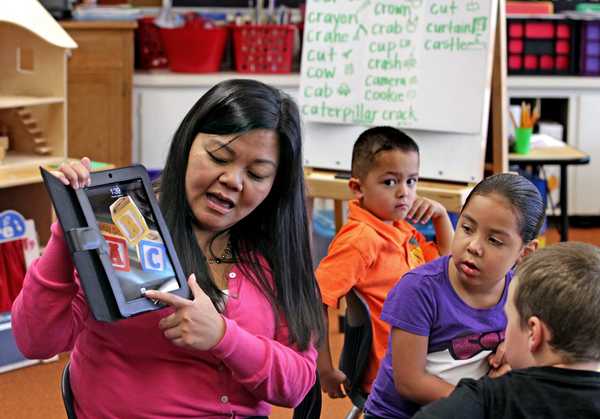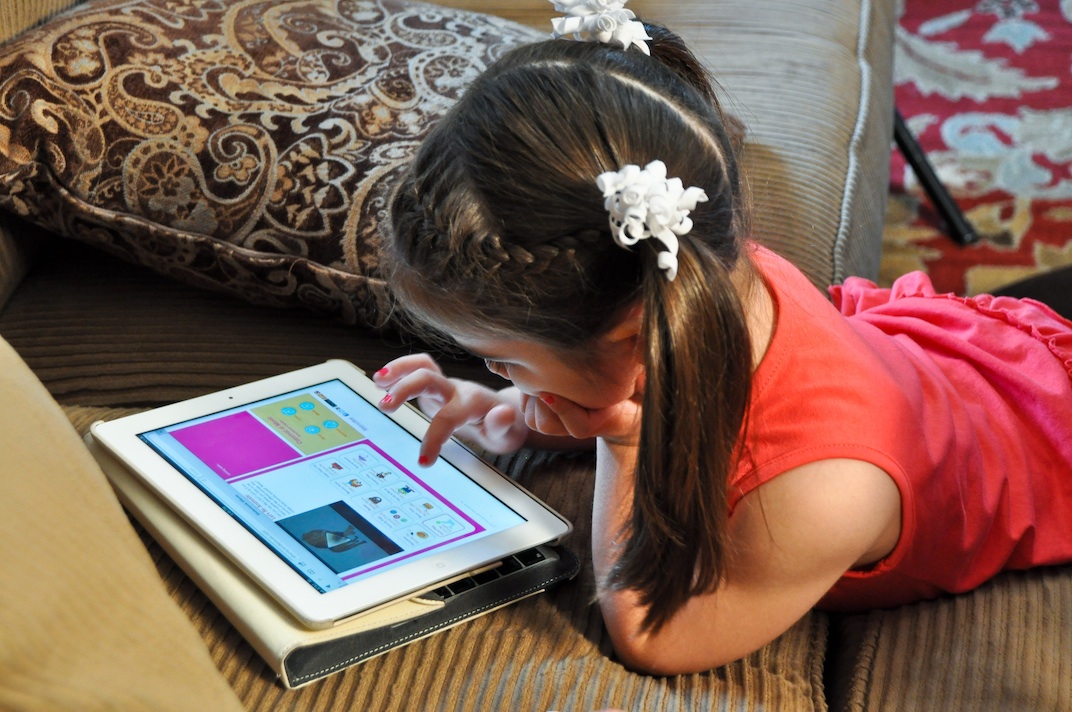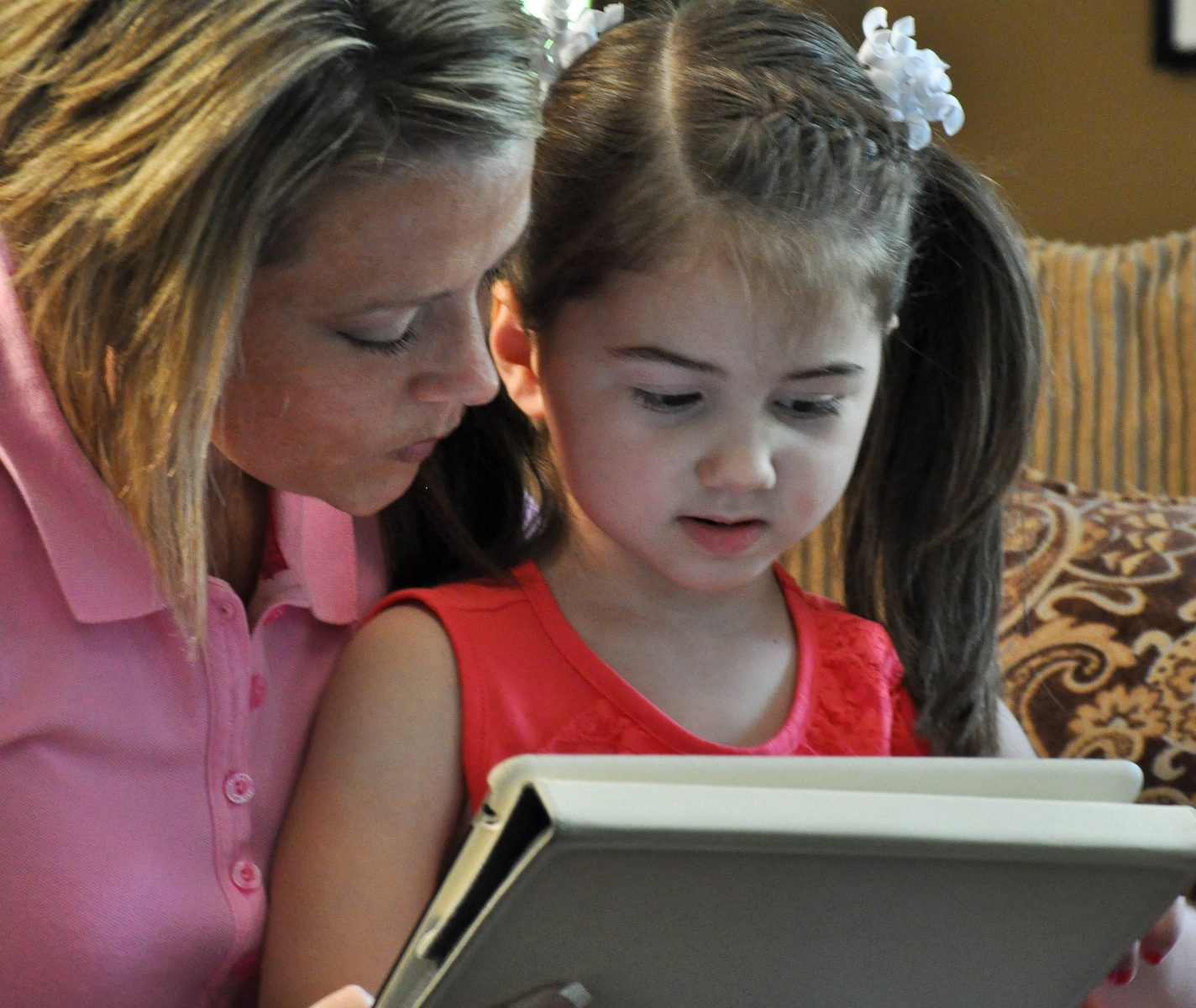
Reading nooks, daily book reading during circle time, bring-your-favorite-book-to-school day, dressing up like the Cat in the Hat for Dr. Seuss’ birthday—the opportunities for preschool teachers to infuse early literacy and language activities into a daycare or toddler curriculum abound. A quick search on Pinterest can quickly add even more ideas! However, discovering age-appropriate and research-supported methods to integrate eBooks and digital learning into a preschool curriculum can be a bit more challenging.
Using eBooks during shared book reading in a preschool curriculum
A new study published in the Journal of Literacy and Technology observed how preschool teachers used eBooks in the classroom. As published in the article, the observations of Kathleen Roskos, PhD and Karen Burstein, PhD focused on preschool teachers’ implementation of a vocabulary-focused, shared book routine; language strategies at the touchscreen; mobile devices to extend the shared reading experience; and children’s learning of 40 target words. The research team wanted to gain a better understanding of using eBooks for kids as an instructional resource in a preschool curriculum.
Over a four-week period, the eight preschool teachers participating in the study imbedded eight eBook shared reading sessions with each eBook being read two times. In addition, the children browsed or reread the eBooks on a digital device. The researchers found that eBooks can support vocabulary acquisition and that teachers easily transitioned from traditional books to eBooks as part of the shared book reading. The teachers used the same reading methods whether using a traditional book or an eBook. However, it came as no surprise that additional digital learning research specifically focused on instructional techniques and strategies are needed to maximize eBook features and support eBook browsing and reading on mobile devices, especially when used with the youngest learners as part of a preschool or toddler curriculum. The researchers noted that eBooks with rich visualizations, sounds and music appear to support early language and literacy, especially for young at-risk students.
You can download the full article, “Descriptive Observations of Ebook Shared Reading at Preschool,” here.
Preschool curriculum uses eBooks and digital learning with music
With twice as many children reading eBooks today than just two years ago, eBooks for kids can become a key component to a preschool or daycare curriculum and a way to increase parent involvement in early childhood education. At Kindermusik International, we know how important it is to implement the latest research (and tools!) on how young children learn best. After all, with more than 35 years of experience creating music classes for toddlers, babies, big kids, and families, as well as standards-aligned preschool and daycare curriculum, we’ve experienced breakthroughs over the years on reaching even the youngest learner.
 In fact, we continue to create new early childhood curriculum that implements the latest research, including how to use digital learning—and eBooks for kids—in an age-appropriate and effective manner. For example, with Kindermusik@Home parents can easily access favorite Kindermusik songs and activities, music, eBooks, and lyrics—as well as recipes, learning games for kids, crafts, and more in a green-friendly digital format any time from any smart phone, iPad, tablet, laptop, or computer. Families and teachers also love our music apps for kids.
In fact, we continue to create new early childhood curriculum that implements the latest research, including how to use digital learning—and eBooks for kids—in an age-appropriate and effective manner. For example, with Kindermusik@Home parents can easily access favorite Kindermusik songs and activities, music, eBooks, and lyrics—as well as recipes, learning games for kids, crafts, and more in a green-friendly digital format any time from any smart phone, iPad, tablet, laptop, or computer. Families and teachers also love our music apps for kids.







